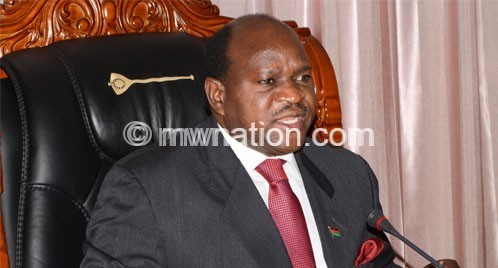No House meet before elections

Malawi President Joyce Banda will not reconvene the National Assembly within the next 30 days before the tripartite elections to resolve outstanding business, among them the Cashgate report, to refrain from breaking the law, the Weekend Nation has established.
Henry Phoya, Leader of the House that was dissolved on March 20, said in an interview on Thursday that the Constitution allows the President to reconvene the House, after it has been dissolved, only on two conditions: a constitutional crisis or a national emergency.
Phoya was reacting to calls by leaders of opposition political parties and former members of the Public Accounts Committee (PAC) of Parliament that also investigated the Cashgate, including a social commentator, that the House should be reconvened before elections to clear its in-tray.
“Let me say that in making that decision, the State President would have to be very careful to ascertain that in doing so she is not violating the Constitution,” said Phoya, warning that the President would be in breach of the Constitution if she reconvened the House on matters that don’t satisfy the two constitutional requirements.
Following the dissolution of Parliament on March 20 as required by the Constitution, Speaker of that House, Henry Chimunthu Banda, said in an interview on Tuesday that all the business that had not yet been concluded before that date had lapsed and the likelihood of being re-introduced by the incoming National Assembly is without precedent.
“I don’t see how the business will be re-introduced. That will be unprecedented. It is unheard of. It will be the first time in the history of Parliament that outstanding business that lapsed in an outgoing National Assembly gets re-introduced in the incoming National Assembly,” explained Chimunthu Banda.
But former leader of the United Democratic Front (UDF) in the House, Clement Chiwaya, who also served in PAC, said in an interview on Thursday that not re-convening the House before the elections would affect the issues even if they were to be re-introduced in the new National Assembly.
“The first problem is that the one who chaired PAC, Beatrice Mwangonde, will not be contesting in the elections. She will not be in the next House to table and speak on the report as chairperson. The second problem is that some members who were in PAC will not return to the House. This will affect institutional memory,” lamented Chiwaya.
Confirming that she will not be in the next National Assembly, Mwangonde said that she was disappointed that the House was dissolved when her committee was ready with its report on Cashgate. She insisted that the House should meet before elections.
“The efforts that were made to get to the bottom of the Cashgate cannot be in vain. Taxpayers’ money, at a time when people are suffering to get social services, cannot just go down the drain. It must occur to those in authority that they owe it to the people of Malawi that the Cashgate report is tabled in the House,” said Mwangonde.
Chiwaya and Mwangonde said PAC met for about five times and estimated the cost of a single meeting at K24 million.
“You mean all that money can just be wasted?” wondered Mwangonde.
Another former member of PAC, Henry Mussa, who was also the chief whip of the Democratic Progressive Party (DPP) in the House, recommended that if the House cannot be reconvened within the next 30 days, any political party that forms the next government should include resuscitation of the lapsed business among its priorities.
“As DPP, we will insist that the matters that were not concluded, especially those that deal with financial probity must never be allowed to die away just like that. So, whichever party forms the next administration or whoever will be the members of PAC, issues of the Cashgate and how proceeds from the sale of the presidential jet were used (Jetgate) must be resuscitated,” said Mussa.
Spokesperson of MCP parliamentarians in the House that was dissolved, Jolly Kalero, accused the government of deliberately dilly-dallying to have the outstanding issues concluded because it knew that Parliament would dissolve and they (issues) would lapse.
“It is a fact that since Cashgate and the sale of the presidential jet came up, this government has not acted in good faith,” Kalero claimed. “That is why they used the dissolution of Parliament to their convenience.”
But Phoya argued that government never acted in bad faith and was not responsible for the delays to conclude the issues surrounding the Cashgate or the dissolution of the House.
“Firstly, it must be put on record that no-one dissolved the House. The House dissolved automatically on the operation of the law,” argued Phoya. “Secondly, it is not correct that there was any attempt by Government to trick the public on the issue of Cashgate.”
To prove that government always acted in good faith, Phoya said, it is President Joyce Banda who demanded that Parliament should meet, earlier than schedule, over the Cashgate immediately after it was discovered, adding that government always provided funding to PAC to do its work.
“I have taken the trouble to give you all this background for you to understand and refute any suggestions that government never acted in good faith on this matter. As you can see, the delays to conclude these issues were not caused by government,” said Phoya.
But social economic commentator Mabvuto Bamusi observed that the suspended donor aid which has caused government to revise its spending downwards, should have caused the need to call for the National Assembly to meet.
“Does government not feel it owes the people of Malawi an explanation that while social services are suffering, the President continues to spend lavishly?” queried Bamusi.





